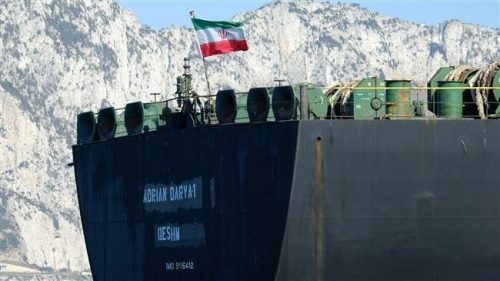
Iran warned the U.S. against apprehending a supertanker carrying the Middle East country’s oil and said it couldn’t be clear on the ship’s ultimate destination, leaving the fate of the vessel uncertain as it sailed into the Mediterranean Sea from Gibraltar, where it had been detained.
The tanker, formerly called the Grace 1 and now known as the Adrian Darya 1, was signaling Kalamata, Greece — at least for now — with an arrival date of Aug. 25, tanker-tracking data compiled by Bloomberg at 1:45 p.m. London time show.
It left Gibraltar Sunday night after being detained there since early July, when British forces seized it on suspicion of carrying oil to Syria in violation of European sanctions. The U.S., which has sanctions against Iran, is seeking to prevent anyone from doing business with the ship.
Iranian Crude Tanker Leaves Gibraltar Waters: What Happens Next?
U.S. sanctions mean Iran cannot be “very transparent” about the destination of the tanker, Iranian Foreign Minister Javad Zarif said at a press conference in Helsinki. He said the U.S. is trying to “bully others from purchasing our oil” and that he hopes the release of the vessel will de-escalate tensions in the Persian Gulf.
The incident is one of several in recent months that have strained relations between Iran and the West, following the U.S. reinstatement of sanctions on the Islamic Republic last year. Iran has maintained that the ship’s original detention on July 4 was unlawful. The Persian Gulf state continues to hold a U.K.-flagged tanker, the Stena Impero. Aggression in the region has threatened shipping in recent months in the Strait of Hormuz, the world’s most critical waterway for oil supplies.
“The U.S. surely can’t seize the Iranian tanker and, if it does, it would pose a threat to international maritime security,” Iran’s Foreign Ministry spokesman Abbas Mousavi said. Iran warned the U.S. via “diplomatic channels,” including Switzerland, against interfering with the tanker, in international waters, Mousavi said at a news conference in Tehran. Swiss diplomats serve as interlocutors between the U.S. and Iran.
It’s not known where the Iranian vessel is ultimately headed. Greek authorities haven’t received formal notification that the vessel intends to head to a port in the country, according to a spokesman for Greece’s coast guard. Kalamata’s port usually serves pleasure craft like sailboats and cruise ships, data compiled by Bloomberg show.
The waters off Kalamata could be a possible location for ship-to-ship cargo transfers, according to two vessel brokers without specific information about the tanker’s plans. A ship’s destination is entered manually into its Automatic Identification System and is picked up by vessel-tracking. The destinations can be altered multiple times on the same journey.
Gibraltar rejected an attempt by the U.S. to block the Iranian supertanker, saying that EU regulations don’t allow it to seek a court order to detain the vessel.
A complaint unsealed in Washington stated that “Oil Tanker ‘Grace 1,’ all petroleum aboard it and $995,000 are subject to forfeiture,” according to a Justice Department statement. The statement alleges a “scheme to unlawfully access the U.S. financial system to support illicit shipments” of oil from Iran to Syria in violation of U.S. sanctions, money laundering and terrorism statutes.
Gibraltar last week released the vessel, after the government said Iran had provided assurances that the ship would not sail to a destination sanctioned by the EU. In response, the U.S. said it was gravely disappointed with Britain, and it warned that ports, banks and anyone else who does business with the vessel or its crew might be subject to sanctions, according to two administration officials.
Source: Bloomberg